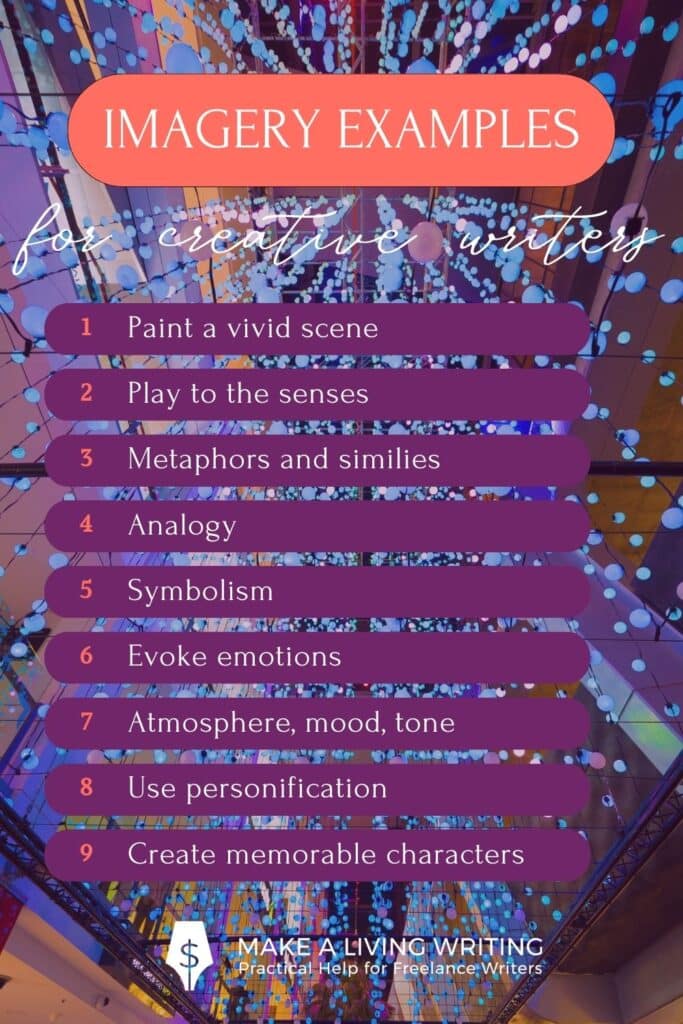Imagery is figurative language that prompts the reader’s creativeness to create a transparent psychological image, convey tone, and elicit emotion. You will discover imagery examples in all places. From centuries-old Charles Dickens novels and Shakespearian performs to modern-day blogs and ads, imagery stays one of the generally used writing strategies.
On this article, we’ll discover examples of images in movie and literature, sensible suggestions, and strategies that will help you deliver your writing to life.

9 imagery examples for writers
For any author, imagery is a crucial software to tug out of your field of tips to raise your work. Listed here are 9 imagery examples to get you began.
Paint a vivid scene
Creating surroundings within the readers’ thoughts is an important facet of writing. When readers can clearly image the scene of their thoughts, they’re much extra prone to bear in mind the story and take away the message whether or not that be a theme or a name to motion.
To spice up your scene descriptions, attempt incorporating extra adjectives, or as I prefer to name them “juicy phrases.”
As a substitute of claiming, “The solar was setting” you would possibly say, “The coral sky was ablaze because the golden solar dipped under the horizon, casting lengthy, smokey shadows of jagged mountains throughout the tranquil valley.”
Play to the senses
One other approach to get your phrases to leap off the web page is to have interaction the 5 senses. Utilizing sensory language akin to visible, auditory, olfactory, tactile, and gustatory imagery provides new layers that collectively helps to create an immersive expertise for the reader.
Visible imagery (sight)
Her lengthy golden hair was draped over her shoulder and tied with a black velvet ribbon.
Auditory imagery (sound)
The sunshine spring rain fell in a melodic rhythm on the flimsy tin roof of the dilapidated hen coop.
Olfactory imagery (scent)
Coming into the bakery, my senses are bombarded with swirling scents of freshly baked bread, vanilla icing, and fruity pastries.
Tactile imagery (contact)
I felt alive, squishing smooth heat sand between my moist toes as I ran up the seashore.
Gustatory imagery (style)
Bitter darkish chocolate with bursts of crunchy sea salt and silky caramel.
Metaphors and similes
Metaphors and similes can be utilized to make each literal and figurative comparisons memorabe. A simile makes a comparability utilizing “like” or “as,” whereas a metaphor makes a direct comparability between unrelated issues with out “like” or “as.”
Metaphor examples
- Her presence is a ray of sunshine
- He has a coronary heart of gold
- His anger is a raging hearth
- I’ve discovered her, she’s an angel
Simile examples
- Her room was so messy it smelled like one thing had died in there
- He ran as quick as a cheetah
- My coronary heart beat like a drum
- The dancer leapt like a gazelle, as gentle as a feather
Analogy
A great analogy might help a reader visualize and perceive an summary thought. Just like metaphors and similes, analogies enable us to clarify a tough idea by evaluating it to one thing acquainted and easier.
For instance,
- The well-known Forrest Gump quote “Life is sort of a field of goodies, you by no means know what you will get” is a commentary on the unpredictability of life (that is additionally an instance of simile)
- In The Wizard of Oz, Dorothy’s journey to the Emerald Metropolis is an analogy for self-discovery
- The Phantom’s masks in The Phantom of the Opera is a similar image for the metaphorical masks that individuals put on to cover their true selves
- The chaos of a sinking ship in The Titanic is an analogy to society’s class system, demonstrating how everyone seems to be equal within the face of catastrophe
Symbolism
Symbolism or symbolic imagery can talk highly effective messages and themes in refined however impactful methods.
Usually what hallmarks a bit as a traditional is its deep and complicated symbolism. There are various frequent symbols you should use as recurring motifs to counterpoint your writing, akin to owls (mind/knowledge), doves (peace), roses or hearts (love/romance), and sunflowers (happiness).
Listed here are a couple of extra examples.
- The raven in Edgar Allan Poe’s The Raven represents many issues together with loss, unhealthy omen, prophecy, and perception
- The inexperienced gentle in The Nice Gatsby by F. Scott Fitzgerald symbolizes Gatsby’s unwavering love for Daisy
- The Ferris wheel in Tuck Eternal by Natalie Babbitt represents the passage of time occurring across the Tucks whereas they continue to be stagnant on the heart
Evoke feelings
Good examples of images each deliver out the feelings of the characters and of the reader. Natural imagery is when a author describes a personality’s psychological or emotional state.
For instance, “her coronary heart fluttered as her cheeks blushed a vibrant shade of pink” or, “he fell to his knees from the overwhelming pang of grief realizing he would by no means see her once more.”
An in-depth description of an emotional occasion or character’s mindset might help the reader relate to these emotions and put themselves within the story, eliciting an emotional response.
Ambiance, temper, and tone
Imagery performs a pivotal position in setting the environment, temper, and tone of an article.
An creator can emphasize friendship through the use of imagery of togetherness to evoke emotions of pleasure and belonging, bringing a light-weight, glad tone to the story.
A bit can tackle a unfavorable tone of ache and disappointment with imagery of isolation and despair to emphasise loss.
Examples of tales with a darkish tone:
- Dracula by Bram Stoker
- Frankenstein by Mary Shelley
- The Raven by Edgar Allan Poe
Examples of tales with a feel-good, gentle tone:
- Anne of Inexperienced Gables by L.M Montgomery
- Satisfaction and Prejudice by Jane Austin
- Little Ladies by Louisa Could Alcott
Use personification
Personification is a superb instance of how imagery can breathe life into your writing. Giving human traits to an object, animal, and even phenomena helps authors add character and depth to their descriptions.
Personification is a way that helps readers join with a bit the place it makes the creator’s phrases extra partaking, relatable, and memorable.
For instance:
- Alternative got here knocking on his door
- The wind whispered its secrets and techniques throughout the valley
- The blooming flowers woke as much as say good morning
- The automotive gave a protesting groan asking to be taken again to the storage
- If these partitions might speak they’d have lots to say
Create memorable characters
Authors who use imagery properly have the outstanding capability to deliver their characters to life. With vivid descriptions of their character’s look, mannerisms, interior ideas, and character traits, writers could make readers see themselves or folks they know within the characters.
Look
As a substitute of “He’s a nice-looking man,” attempt, “His piercing blue eyes sparkled like sapphires towards the backdrop of his flawless olive pores and skin.”
Mannerisms
As a substitute of “She was nervous,” attempt, “She compulsively tapped her fingers on the desk, bit her lip, and darted her eyes forwards and backwards.”
Inside ideas
As a substitute of “He was unhappy,” attempt, “A darkish cloud hung over his head and he felt an immovable weight decide on his chest.”
Character traits
As a substitute of “She was type,” attempt, “Her heat smile and laughter at all times felt just like the clouds had parted to let the solar shine by way of.”
Writers are artists who paint psychological photos within the minds of readers utilizing their phrases. Selecting these phrases correctly makes all of the distinction in making characters, settings, and concepts memorable and relatable to audiences.
From metaphors to personification to setting the temper, imagery examples could be discovered woven all through all varieties of writing. So whether or not you’re a copywriter, artistic author, or blogger searching for methods to raise your craft, mess around with imagery and see your phrases come alive.
